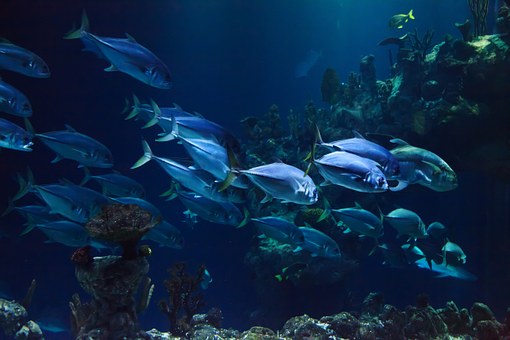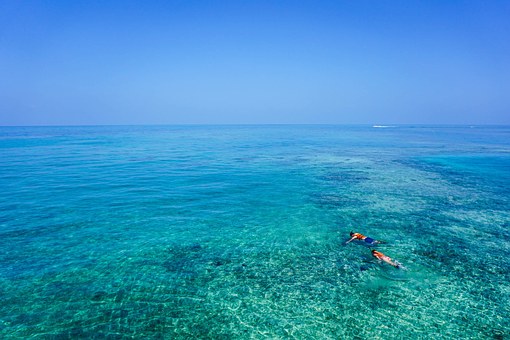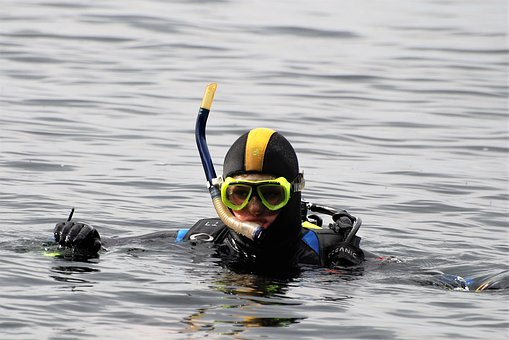What’s the Difference Between Deep Sea Diving, Snorkelling, and Scuba Diving?
Deep sea diving, snorkelling, and scuba diving are three of the most popular underwater activities. They allow divers to explore and admire the wide variety of marine life, corals, and adventures the ocean holds. However, all three of these diving methods are very different and differ greatly in the ways they allow divers to explore the ocean.
What is Deep Sea Diving?

Deep sea diving requires specialised training from diving professionals as it allows divers to dive beyond the scuba diving limit of 40 metres. However, PADI defines any dive from 18 to 30 metres as a “deep dive”. PADI also consider deep diving a form of technical diving and so they train people specifically for this. Both the diver’s equipment and abilities must be adapted to deal with the challenges of diving at a greater depth.
How to Train to be a Deep Sea Diver
Training to be a deep diver requires two days of your time. The PADI Deep Diver course will work to extend your maximum depth limit to 40 meters. It will also teach you new diving techniques, give you more experience, and teach you how to manage nitrogen narcosis. Our customers at Oyster Diving often say that this is their favourite specialist dive course as it opens up the opportunity to explore the ocean further. Book our PADI deep diver course today and take your diving to new depths.
Deep Sea Diving Equipment You Need
Deep sea diving requires specialised equipment that is able to function effectively at significant ocean depths. The deeper you dive, the more you will rely on your equipment. So, it is important you purchase the correct equipment pieces to keep you safe underwater and help you enjoy the deep dive experience. You can find all the deep diving equipment items you’ll need here.
The Benefits of Deep Sea Diving
- Exploring the depths: sometimes, the best things to see underwater are at deeper depths and deep diving helps you experience these for yourself.
- The quiet of being underwater: deep diving lets you enjoy the quiet of the deep with only your regulator sounds and the low bubble sounds to break the silence.
- New experiences: becoming a deep diver allows to explore unique and unusual dive sites. The diver descends to depths and enjoys experiences that cannot be accomplished in shallower waters.
What is Snorkelling?

Let’s start with the basics first. Snorkelling a method of exploring the ocean from the surface using a snorkel dive mask and a breathing tube. Snorkelling allows diver the chance to observe marine plants, coral reefs, and fish from just beneath the water’s surface. Most people tend to enjoy snorkelling as a recreation sport. That is, it’s something they enjoy while on a diving holiday or vacation.
How to Train for Snorkelling
Snorkelling requires the least amount of training out of the three diving options in this article. Someone who has never been snorkelling before can be in the way within minutes. All that is required is a good grasp of how to use the mask, snorkel, and fins. Snorkelling can be practised by any age and is the perfect activity.
Snorkelling Equipment You Need
If you want to enjoy snorkelling, there are a few essential equipment pieces you’ll be needing. Snorkelling requires a dive mask that covers both your eyes and nose with either an L or J-shaped breathing tube. The mask helps keep water out of your eyes and from going up your nose, while the snorkel allows you to keep your face underwater while still being able to breathe.
The Benefits of Snorkelling
Snorkelling is one of the most popular recreational activities and it’s not hard to see why. Snorkelling provides so many fantastic benefits, including the following:
- Fun for all the family: it doesn’t matter what age you are or whether you have any previous diving experience, snorkelling is ideal for everyone. Snorkelling is considered safe for children and is a great activity to enjoy together as a family.
- Prevents rheumatism and is good for your heart: snorkelling provides excellent fitness benefits and can help ease symptoms of rheumatic disease. What’s more, it has been known to strengthen the heart muscle.
- Inexpensive hobby: snorkelling is inexpensive. Once you have the equipment, you’re ready to go.
- Helps with stress management and improve breathing: snorkelling is well-known stress management technique as it helps you learn how to control your breathing. After just a few snorkelling sessions, you’ll have far better control of your breathing.
What is Scuba Diving?

Scuba diving allows a diver to explore at much greater depths than snorkelling allows for. A scuba diver will be a self-contained underwater breathing supply so that they can be completely independent of the water’s surface and breathe underwater as they explore.
Scuba diving can be enjoyed recreationally for exploring ship wrecks, underwater caves, and seeing fish up close in their natural habitat. However, it isn’t just a hobby and there are many people for whom scuba diving is used professionally in their jobs; including offshore construction, military diving operations, and underwater welding (to name a few).
How to Train to Scuba Dive
Learning to scuba dive requires a lot more training than snorkelling as it requires divers to stay under the water for longer and use breathing equipment safely. Not only that, but scuba diving training helps teach divers the correct safety procedures and buoyancy techniques, allowing divers to enjoy underwater diving and exploration safely.
Scuba Diving Equipment You Need
Scuba diving requires a lot more equipment than snorkelling does, including a well-fitting dive mask, a pressurised gas tank, a wetsuit or drysuit (depending on your preference), swim fins, and a scuba regulator. You need the right scuba gear to enjoy your dive experience. There are also a number of essential scuba diving equipment items you must have here.
The Benefits of Scuba Diving
- Helps improve breathing techniques: scuba diving is one of the best aerobic activities for improving your breathing. You have to learn how to breathe slowly and stabilise your breathing when you scuba dive. So, many people who suffer from asthma find this exercise extremely helpful and beneficial.
- Reduces stress: Scuba diving is a great anti-stress activity as it requires calm breathing, and this helps you gain more mental balance and control in life.
- Explore beautiful marine life: advanced scuba diving allows you to dive deep down into underwater caves and discover coral reefs and clusters of marine life.
- Scuba diving increases your confidence as you develop your skills and learn new things.
The Biggest Differences Between Scuba Diving, Snorkelling, and Deep Sea Diving
Although both scuba diving and snorkelling are popular recreational activities, with the main goal being to observe the natural wonders of the sea, the biggest difference between them is their exploration potential. A snorkeler can enjoy the colourful marine life and vibrant reefs submerged in the shallows from the surface of the water. Meanwhile, a scuba diver has the option to dive far deeper and stay underwater significantly longer periods of time and explore.
Deep diving allows for the deepest exploration out of the three diving styles we’ve compared, so requires a whole new skill level from divers. Deep diving allows for exploration to be enjoyed at completely new depths for divers keen to explore as much of the ocean as they can.
Which Diving Option is the Best?
Now that we’ve compared deep sea diving, snorkelling, and scuba diving, the question is not which option is best but rather which is best for your purpose. You should have a pretty good idea of what you can do at your current skill level, what you’ll need to do depending on your reason for going underwater, and whether you need to do any further training. Whichever dive option you choose, always be sure to prioritise your safety so that you can make the most out of the experience.
Get dive ready with all the latest dive gear in our shop! We have everything you need for all types of diving, so get browsing because the ocean is waiting.
